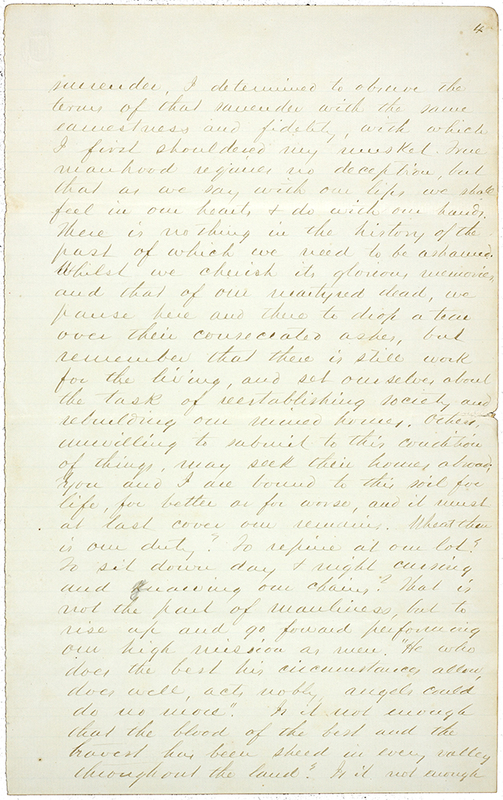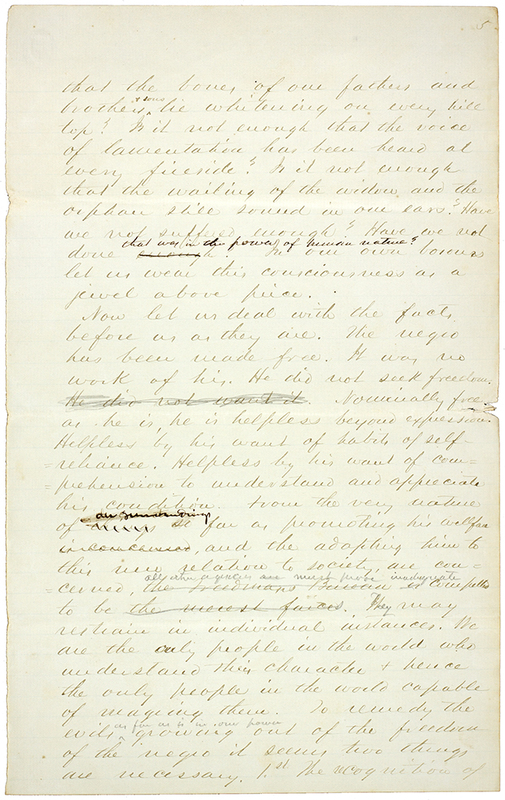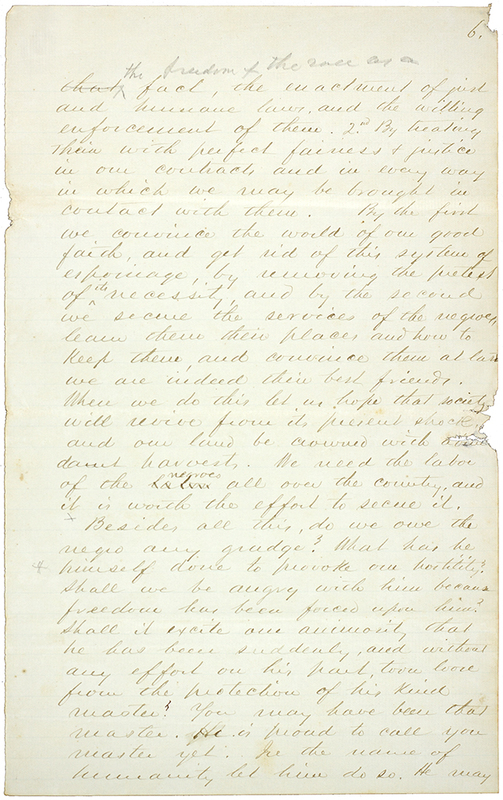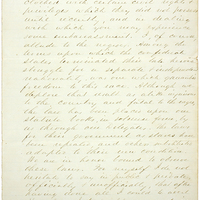Charge to Grand Jury, Judge Henry Clayton, 1866
Item
- Title
- Charge to Grand Jury, Judge Henry Clayton, 1866
- Description
- Excerpt from a speech given by Henry Clayton in his capacity as a Circuit Court judge, as a charge to a grand jury. It expresses his thoughts on the Civil War, the end of slavery, and the responsibilities of whites to the newly freed.
- Transcript
-
[image 0003]
.....
There is a class of our population clothed with certain civil rights and privileges which they did not possess until recently, and in dealing with which you may experience some embarrassment. I, of course, allude to the negroes. Among the terms upon which the Confederate States terminated their late heroic struggle for a separate & independent nationality, was one which guarantied freedom to this race. Although we deplore that result as alike injurious to the country and fatal to the negro, the law has been placed upon our statute books, in solemn form, by us through our delegates. The laws for their government as slaves have been repealed, and others substituted adapted to their new condition. We are in honor bound to observe these laws. For myself I do not hesitate to say in public & private, officially & unofficially, that, after having done all I could to avert it, when I took off my sword in
[image 0004]
surrender, I determined to observe the terms of that surrender with the same earnestness and fidelity, with which I first shouldered my musket. True manhood requires no deception, but that as we say with our lips we shall feel with our heart, & do with our hands. There is nothing in the history of the past of which we need be ashamed. Whilst we cherish its glorious memories, and that of our martyred dead, we pause here and there to drop a tear over their consecrated ashes, but remember that there is still work for the living, and set ourselves about the task of reestablishing society and rebuilding our ruined homes. Others, unwilling to submit to this condition of things, may seek their homes abroad; you and I are bound to this soil for life, for better or for worse, and it must at last cover our remains. What then is our duty? To repine at our lot? That is not the part of manliness, but to rise up and go forward performing our high mission as men. "He who does the best his circumstances allow, does well, acts nobly, angels could do no more." Is it not enough that the blood of the best and bravest has been shed in every valley throughout the land? Is it not enough
[image 0005]
that the bones of our fathers and brothers & sons lie whitening on every hill top? Is it not enough that the voice of lamentation has been heard at every fireside? Is it not enough that the wailing of the widow and orphan still sound in our ears? Have we not suffered enough? Have we not done that was in the power of human nature? In our bosoms let us wear this consciousness as a jewel above price.
Now let us deal with the facts before us as they are. The negro has been made free. It was no work of his. He did not seek freedom. Nominally free as he is, he is helpless beyond expression. Helpless by his want of habits of self-reliance. Helpless by his want of comprehension to understand and appreciate his condition. From the very nature of our surroundings, so far as promoting his welfare and adapting him to this new relation to society, are concerned, all [?] agencies must prove inadequate. They may restrain in individual instances. We are the only people in the world who understand his character & hence the only people in the world capable of managing him. To remedy the evils as far as is in our power growing out of the freedom of the negro it seems two things are necessary. 1st The recognition of
[image 0006]
the freedom of the race as a fact, the enactment of just and humane laws, and the willing enforcement of them. 2nd By treating them with perfect fairness & justice in our contracts, and in every way in which we may be brought in contact with them. By the first we convince the world of our good faith, and get rid of this system of espionage, by removing the pretext of its necessity, and by the second we secure the services of the negroes, leave them their places and how to keep them, and convince them at last we are indeed their best friends. When we do this let us hope that society will revive from its present shock, and our land be crowned with abundant harvests. We need the labor of the negroes all over the country, and it is worth the effort to secure it.
Besides all this, do we owe the negro any grudge? What has he himself done to provoke our hostility? Shall we be angry with him because freedom has been forced upon him? Shall it excite our animosity because he has been suddenly, and without any effort on his part, torn loose from the protection of a kind master? You may have been that master. He is proud to call you master yet. In the name of humanity let him do so. He may
[image 0007]
be older than you and perhaps carried you in his arms when you were an infant. He may have been the companion of your boyhood. You may be bound to him by a thousand ties which only a southern man knows, and which he alone can feel in all its force. It may be that when only a few years ago, you girded on your cartridge box and shouldered your trusty rifle, to go to meet the invaders of your country, you committed to his care your home and your loved ones; and when you were far away upon the weary march, upon the dreadful battlefield, in the trenches, and on the picket line, many and many a time you thought of that faithful old negro, and your heart warmed towards him. Did he not raised the corn and meat that fed your wife and children? And when you returned home did he not welcome you with tears of joy? Was he not faithful to the last? I believe there was scarcely ever such a picture of fidelity in the world, as was exhibited by the negroes towards us during the war! Then let us not cherish animosity towards them, for that which we and they were unable to prevent, and which is a deplorable catastrophe to them, more than to us.
..... - Date
- 1866
- Coverage
- Barbour County, Alabama
- Site pages
- Joe and Nancy Clayton










